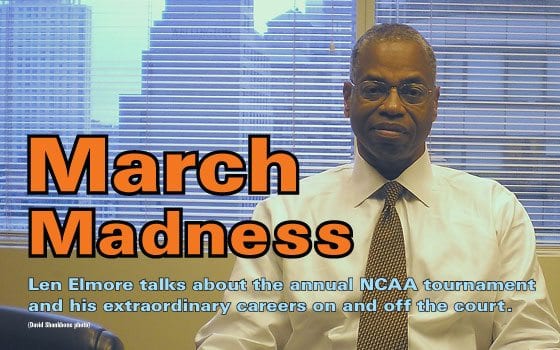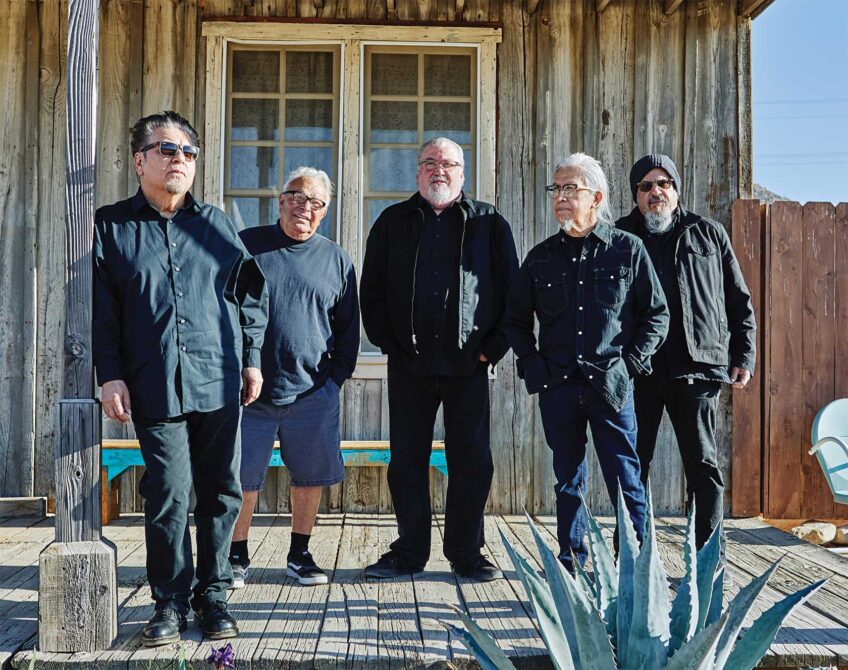
A man long associated with March Madness, Len Elmore is now appearing on CBS for his 12th season as an analyst during the network’s NCAA Men’s Basketball Championship coverage. In addition, he has served as a basketball analyst for ESPN for the past 13 consecutive years, calling ACC and Big East games, including the Big East Tournament.
Elmore is an eight-year NBA veteran, having played with the Indiana Pacers, Kansas City Kings, Milwaukee Bucks, New Jersey Nets and New York Knicks. He spent two seasons with the ABA’s Indiana Pacers in 1975-76 before the franchise joined the NBA.
Elmore is a 1974 graduate of the University of Maryland, where he was a three-time All-ACC player as well as an All-American his senior year. In 2002, the 50th Anniversary of the ACC, he was chosen as one of the ACC’s Top 50 Players of all time.
Elmore also earned a Juris Doctor from Harvard Law School in 1987 and began his law career as an assistant district attorney in Brooklyn, N.Y. He presently serves on The Knight Commission on Intercollegiate Athletics Reform, on the University of Maryland Foundation Board of Trustees, as well as on the Board of Directors of both 1800Flowers.com and Lee Enterprises, Inc. Plus, Len has served as president of the National Basketball Retired Players Association.
Born in the Big Apple on March 28, 1952, Elmore still resides there and was inducted into the New York City Basketball Hall of Fame in 2001. Here, he talks about March Madness and about his extraordinary careers on the court, behind the microphone, and as an attorney.
With everyone filling out their March Madness brackets in office pools right now, let me start by asking who you think has what it takes to win the NCAA Tournament this year?
Boy, there’s not just one team. Obviously, there are the favorites like Syracuse, and certainly Kentucky, a good young team. We could also look at a team like Duke, which has enjoyed a resurgence. After being up and down during the season, the Blue Devils finished strong enough to be considered for a No. 1 seed.
Then, there are those teams that people haven’t really spoken about much, like Kansas, which has played very well, as has Missouri. And there are others with plenty of potential, such as Michigan State, which worked its way into a No. 1 seed.
Most people didn’t have this level of expectation for them after they finished .500 in the Big Ten last year. But, The Spartans have really redeemed themselves with a lot of youth, although they also have a terrific veteran in Draymond Green.
Ohio State sort of has to overcome some of their issues, but they’re very capable of going all the way in a six-game series. And North Carolina is definitely built to go the distance in the tournament. So, those are the teams I think we should be looking at, but in the end, I really believe that Syracuse and Kentucky are the two teams that have shown very few weaknesses.
When filling out my brackets, I tend to consider coaching, point guards, injuries and momentum.
Syracuse is uniquely set up in terms of all those variables, especially the point guard situation. But we’ve seen them in that position the last couple of years, and they still went out early, because of a tough matchup against teams who were able to handle them really well.
So, your strategy might work some of the time, but you may as well throw stats out the window if some magic dust has been sprinkled on a Cinderella team.
I think March Madness makes for the most exciting and compelling spectacular in all of sports. Why is that?
The beauty of the NCAA College Basketball Tournament is in its structure, a one and done situation, which includes so many teams not considered serious contenders who nevertheless have the potential to overcome their shortcomings and rise to the occasion.
You also have the fallibility of a heavy favorite who might make a few fatal mistakes in a game and find itself facing elimination. Those are the components of the drama that make March Madness.
Do you feel a special bond to Jeremy Lin, as you both attended Harvard?
Not necessarily a Harvard bond. I went to Harvard Law school, not the undergrad, so I can’t say I’m as capable as he is.
The bond I do feel with him has to do with his persevering in developing the fundamental basketball skills he’s displayed. It’s almost an indictment of NBA players how fundamental skills can become an equalizer of great talent. Lin approaches the game with an unselfish attitude, wanting to play with and for his teammates. That’s where his success lies.
Yes, he might not be as talented as many of his opponents. Yet his teammates are better and play harder with him out there on the floor because of his unselfishness.
By comparison, we’ve all too often witnessed NBA stars who attain a certain level and only play for themselves. We’ll have to see whether Lin can sustain this level of play long term, but I think he will always be a success story regardless, simply because he’s demonstrated an attitude that ought to be adopted by more players.
Back in the seventies, you were teammates in Maryland with John Lucas, Tom McMillen and Tom Roy. All of them had been top high school players in their respective states. How did your coach, Lefty Driesell, blend those diverse talents, and how did you get along as a team, race relations-wise?
That’s a pretty interesting question. Coach Driesell was the architect of a system designed to get the most out of our individual talents. And he made sure that everybody had a chance to room with each other to break down barriers. But as far as our actually meshing as a team, that was up to us.
That was based upon both how we were raised as individuals and on our desire to become a unit. In terms of race relations, we were looking for unity, to coalesce, and to cross cultural bridges. We were so close that we’d find ways to socialize together. We lived, hung out and ate together. And our love for each other and development of bonds was so deep that we’re all still friends to this day.
In your day, the NBA only drafted college underclassmen as hardship cases. I think what is overlooked in the success of Jeremy Lin is that he stayed in college, which afforded him an opportunity to study the game while his mind and body matured.
The term “hardship” was a fallacy and a work of art, since there was no filter through which the league would determine whether or not someone was really a hardship case. You wouldn’t believe how many guys from middle-class backgrounds left school early because they wanted the money.
That being said, I do believe staying in college for four years obviously allows one to develop fundamental skills. What’s lost on so many of the young kids who come out early nowadays with tremendous athletic talent, with what the pros call a big “upside,” is that they still need to develop the fundamental base in order to build into an extraordinary talent.
As extremely talented as Lebron James is physically, he still lacks certain fundamentals that might be exposed when his body starts to betray him, if ever. The flip side of that is Kobe Bryant, who is so fundamentally sound. He’s more of an anomaly.
What does Jeremy Lin mean to the NBA?
He’s a terrific story for the league at a time it’s trying to recover its fan base and viewership in the wake of the lockout. He’s generating a lot of excitement and bringing new people in who might not have been following the NBA. But whether this level of excitement will last remains to be seen.
You played at a time when the game was bigger than the sum of its players, even with the superstars of your time. Does the sport still feel the same to him?
In all honesty, I’m not nearly as much of a fan of the NBA as I was maybe 10 or 15 years ago, or certainly as I was when I was a player. It’s become more entertainment focused, and less focused on the purity of the game. That’s not necessarily a bad thing; it’s just not my cup of tea.
One of the reasons I enjoy college basketball a little more is because of its team orientation as opposed to individual orientation. I’ve always been taught that basketball is a team game and greater than the sum of its parts.
A lot of kids think they can become a superstar athlete without an education. Very few are aware of the financial problems many pros encounter after they retire. You managed successfully to have other careers after your NBA days. How did college prepare you for your post-graduate career?
Getting a well-rounded education and developing a love of learning that hopefully will continue to last my lifetime certainly helped prepare me to understand what’s coming at me in this world and to adapt.
I can’t say there was one thing in particular that helped prepare me for life beyond basketball except for the exposure to college and that laboratory, if you will, that allows us to learn who and what we are, and to be able to utilize that knowledge in real life.
I’m concerned that young people today, far too often, abdicate their responsibilities of learning and adapting and give that over to people who may not always have their best interests at heart. And without a well-rounded education, they get into trouble if they don’t have the skills or the resources to overcome the issues that present themselves.
That’s a big problem today. I also recognize that when I played, we didn’t get paid anything close to what these guys get paid today. So, I knew, despite playing in the NBA, that I would have to prepare for another career or vocation for when my playing days were over, in order to maintain relevancy. I didn’t want to become known for what I used to do.
When you look in the mirror, what do you see?
I see a person who has achieved many goals that he set for himself, and who didn’t allow a few setbacks to interfere with his love of life. And I see a person who is a good husband and a good father, and who will hopefully leave a legacy for my sons to be the same.
What is your earliest childhood memory?
How my mother and father stressed education and always made sure we had a place to study and books to read.
How do you want to be remembered?
I’d like to be remembered as somebody who persevered, who in many ways overcame, who recognized the importance of giving back, particularly to our youth, and as someone who tried to reach back and to catapult the next generation beyond him.






